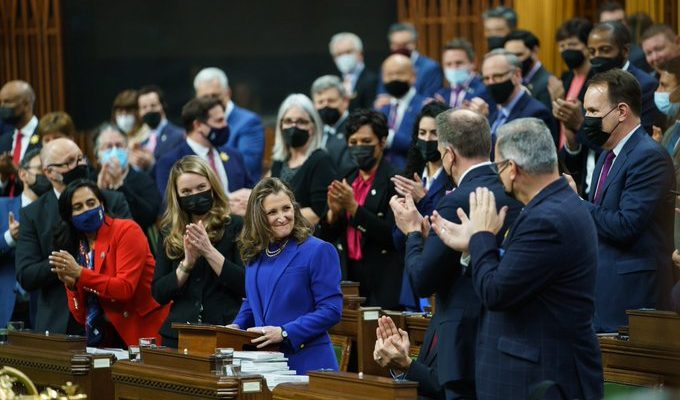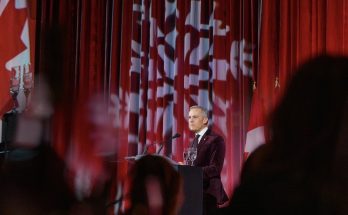The second federal budget with a multi-billion dollar plan meant to help the country combat surging uncertain times with investments to subside Canada’s red-hot housing market and transition to a cleaner, greener economy was tabled on Apr 7 by the Deputy Prime Minister and Minister of Finance Chrystia Freeland outlining how the federal Liberals propose to uplift the Canadian economy amidst inflation
The budget addresses housing affordability, sustaining and upholding the Canadian military in the face of global instability due to Russia’s war in Ukraine, keeping in mind progressive policy commitments helping to keep them in power.
“This budget invests heavily in economic growth,” Freeland said during a press conference under embargo as part of the budget lockup before tabling it in the House of Commons. “This is a three-part growth plan: It’s a suite of investments in people that will drive growth, with housing as the centerpiece of that investment. It is investments in the green transition, which we all know is essential… And the third element is an investment in productivity.”
“This is a budget that is first and foremost about continuing to have Canadians’ backs. We’ve demonstrated through the pandemic that one of the best ways to make sure our economy comes back strong, is by investing in the right things for Canadians to grow the economy… and it’s done in a fiscally responsible framework,” said Prime Minister Justin Trudeau on his way into the chamber for Freeland’s budget speech.
The main highlights of the budget are the proposal to introduce tax-free savings accounts that would give first-time homebuyers the chance to save up to $40,000 and the purchase of the first home would not be taxed. Approximately $725 million would be provided support in this program over five years. To make housing affordable, the federal government is launching a new housing accelerator fund — worth $4 billion over five years — to help municipalities speed up housing development with the goal to create 100,000 new housing units in the next five years. The rapid housing initiative will also be extended by the budget by pledging $1.5 billion over two years to create at least 6,000 new housing units to help overcome homelessness.
To promote its commitment to its confidence and supply agreement with the NDP, the federal government is promising $5.3 billion over five years and $1.7 billion each year thereafter for a national dental care program. This year children under 12 years old would be taken care of and will expand to cover Canadians under 18 years old, seniors, and people with disabilities in 2023. The program would be fully implemented by 2025 and is limited to families with incomes of less than $90,000 a year. For those with an income of less than $70,000, no co-payments will be required.
$8 billion over five years boosting of defense spending by the budget would bring Canada’s defense budget to a projected 1.5 percent of GDP. $875 million over five years to combat rising threats to cybersecurity are also earmarked in the budget including $100 million over six years to strengthen leadership in the Canadian Armed Forces, modernize the military justice system and implement culture change in the CAF.
Canada’s climate change targets are being taken care of by the budget by offering $2.6 billion over five years to finance a new investment tax credit for businesses that spend money on carbon capture, utilization, and storage (CCUS), to extend incentives to attract more Canadians to buy electric cars, vans, trucks, and SUVs. The government also plans to impose a sales mandate to ensure that at least 20 percent of new light-duty vehicle sales will be zero-emission vehicles (ZEVs) by 2026.
Indigenous children, families, and communities would be supported by the budget with additional spending of $11 billion over six years to ensure access for First Nations children to health, social and educational services, and infrastructure improvement on reserves including water and wastewater infrastructure. The budget sets aside $210 million to help communities document, locate and memorialize burial sites at former residential schools to keep its commitment to reconciliation, help the National Centre for Truth and Reconciliation pay for a new building and assist with the “complete disclosure” of federal documents related to residential schools. and allow the RCMP to assist in community-led investigations into burial sites at former residential schools.
Aligning with the government’s diversity and inclusion agenda, the budget promises $100 million over five years for a federal LGBTQ2 action plan, $85 million more to support ongoing work on the anti-racism strategy, and $50 million to support Black-led and Black-serving community organizations including $15 million to support local journalism in underserved communities and to help racialized and religious minority journalists present their experience and perspectives.
#Canada; #CanadaSecondBudget; CanadaBudget2022





